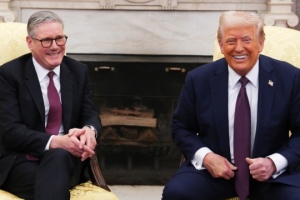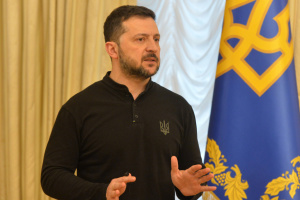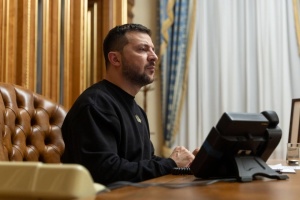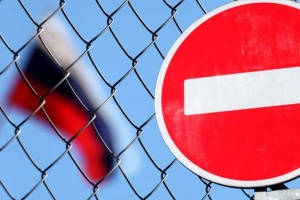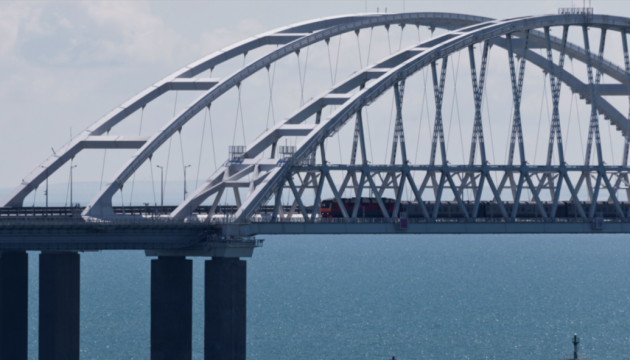
Ukraine in The Hague: Kerch Bridge restricts international shipping, it must come down
Ambassador-at-Large at the Ukrainian Foreign Ministry Anton Korynevych said this in his speech at the Permanent Court of Arbitration in The Hague, where Ukraine started presenting its position at the hearings in the case concerning the violation of the rights of the coastal state under the 1982 UN Convention on the Law of the Sea), Ukrinform reports, referring to the Ukrainian Foreign Ministry's website.
"Russia wants to take the Sea of Azov and Kerch Strait for itself, and so it has built a great gate at their entrance, to keep international shipping out while allowing small Russian river vessels in. Russia now views the Kerch Strait, the Sea of Azov, and perhaps even parts of the Black Sea, as its proprietary waters. Russia wants these waters to be viewed as part of its 21st century empire. And while you will hear Russia’s experts say the Sea of Azov is similar to a lake or a river, Ukraine does not accept this, and neither should this Tribunal. The Sea of Azov is not a lake or a small river delta. It is over 37,000 square kilometers of semi-enclosed sea," Korynevych said.
He added that the Kerch Bridge "is unlawful, and it must come down." According to him, the Kerch Strait should be returned to its status before this illegal threat to navigation began.
"Across this open, vital sea route, the Russian Federation has illegally built a permanent impediment to transit, an exceptionally low bridge. The bridge is lower than suggested by Russia’s own studies; lower than requested by Russia’s own industrial interests; and lower than any bridge built or even proposed in modern times over an international strait. As a result, some of the most important classes of vessels used in international trade can no longer pass through the Strait. The kind of vessels that carried Ukrainian steel, grain, and other foodstuffs to the rest of the world. Today, this bridge not only impedes transit passage, but Russia uses this illegal bridge to send a steady stream of military weapons and supplies to the Crimean peninsula," Korynevych said.
He added that "there are other simple questions at the core of this dispute."
"Can Russia build a bridge — as well as a pipeline and an undersea cable — without evaluating the environmental consequences for this sensitive channel, and the two unique, semi-enclosed seas that it connects? Can Russia threaten priceless artifacts, giving amateurs free reign amongst centuries‑old shipwrecks and encouraging quick photo-ops, including one featuring the Russian Head of State himself? Again, the answers to these questions can only be 'no'," he said.
Korynevych emphasized that Russia had impeded passage through the Kerch Strait and navigation in the Sea of Azov in other ways, as well.
"It has deployed armed men from its Border Guard to inspect more than 1,600 vessels bound for Ukraine, inspecting these vessels at rates far higher than inspections of vessels bound for Russia. It imposed average delays of 40 hours on vessels seeking to transit to Ukrainian Sea of Azov ports; the waiting time for vessels heading to Russia was just three hours. It arbitrarily banned passage through the Kerch Strait to foreign government vessels for a period of six months. It created a mandatory one-way passage regime in the Kerch Strait, and it restricted the pilotage regime such that only Russian vessels can now qualify for exemptions. And those are just its violations in the area of free navigation," he said.
For its part, Russia stated that Ukraine's accusations in international arbitration go beyond the scope of the UN Convention on the Law of the Sea, according to Ukrinform's correspondent in The Hague.
Russian representative Gennady Kuzmin claimed that Ukraine's accusations were allegedly "frivolous" and "no more than another example of systematic abuse of the international justice system."
He also said that most of Ukraine's claims allegedly went beyond the scope of the UN Convention on the Law of the Sea.
"I once again urge you not to succumb to the unfounded, I would say, desperate attempts by Ukraine to obtain some conclusion on the disputed situation between it and the Russian Federation. As will be demonstrated by the Russian lawyer, all claims from Ukraine are groundless, beyond your jurisdiction and should be rejected in full," he said.
Hearings on the merits of Ukraine's claim against the Russian Federation over the violation of the rights of the coastal state under the 1982 UN Convention on the Law of the Sea kicked off in the building of the Peace Palace in The Hague, the Netherlands, at 10:00 on September 23. The hearings will last until October 5.
On September 14, 2016, Ukraine initiated a separate proceeding against the Russian Federation regarding the violation of the UN Convention on the Law of the Sea and seeks to confirm Ukraine's rights in the Black Sea, the Sea of Azov, and the Kerch Strait through an arbitration procedure.
In May 2017, the first meeting of the tribunal under the UN Convention on the Law of the Sea took place, where an arbitration was established to consider the dispute between Ukraine and the Russian Federation. The memorandum, that is, a package of evidence showing that Russia violates the sovereign rights of Ukraine in the Black Sea, the Sea of Azov, and the Kerch Strait, was filed with the Permanent Chamber of the Arbitration Court in The Hague on February 19, 2018. Russia submitted to the International Tribunal its objections to the jurisdiction.


